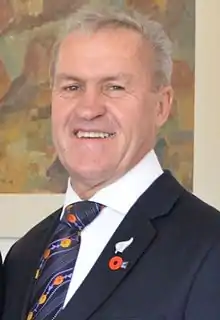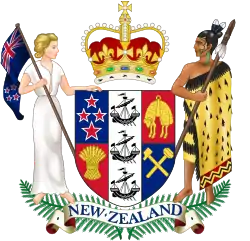David Carter (politician)
Sir David Cunningham Carter KNZM (born 3 April 1952) is a New Zealand National Party politician who served as the 29th Speaker of the New Zealand House of Representatives from 2013 to 2017 and as a Cabinet Minister in the Fourth and Fifth National Governments. He represented the Selwyn electorate in the 44th Parliament and the Banks Peninsula electorate in the 45th Parliament. He served as a list MP from 1999 until he retired at the 2020 election.
Sir David Carter | |
|---|---|
 | |
| 29th Speaker of the New Zealand House of Representatives | |
| In office 1 February 2013 – 7 November 2017 | |
| Prime Minister | John Key Bill English Jacinda Ardern |
| Preceded by | Lockwood Smith |
| Succeeded by | Trevor Mallard |
| 1st Minister for Primary Industries | |
| In office 14 December 2011 – 29 January 2013 | |
| Prime Minister | John Key |
| Preceded by | Himself (portfolios merged) |
| Succeeded by | Nathan Guy |
| 15th Minister of Local Government | |
| In office 3 August 2012 – 29 January 2013 | |
| Prime Minister | John Key |
| Preceded by | Nick Smith |
| Succeeded by | Chris Tremain |
| 33rd Minister of Agriculture | |
| In office 19 November 2008 – 14 December 2011 | |
| Prime Minister | John Key |
| Preceded by | Jim Anderton |
| Succeeded by | Himself as Minister for Primary Industries |
| Minister for Biosecurity | |
| In office 19 November 2008 – 14 December 2011 | |
| Prime Minister | John Key |
| Preceded by | Jim Anderton |
| Succeeded by | Himself as Minister for Primary Industries |
| 29th Minister for Forestry | |
| In office 19 November 2008 – 14 December 2011 | |
| Prime Minister | John Key |
| Preceded by | Jim Anderton |
| Succeeded by | Himself as Minister for Primary Industries |
| 6th Minister for Senior Citizens | |
| In office 31 August 1998 – 10 December 1999 | |
| Prime Minister | Jenny Shipley |
| Preceded by | Robyn McDonald |
| Succeeded by | Lianne Dalziel |
| Member of the New Zealand Parliament for National Party List | |
| In office 1999–2020 | |
| Personal details | |
| Born | 3 April 1952 Christchurch |
| Nationality | New Zealand |
| Political party | National Party |
| Relations | Maurice Carter (father) Matthew Doocey (nephew) |
| Alma mater | Lincoln University |
| Occupation | Farmer |
Early life
Carter was born in Christchurch in 1952, the son of Merle and Maurice Carter.[1] He attended St Bede's College, and has a Bachelor of Agricultural Science degree from Lincoln University. He has farmed sheep and cattle for over 30 years, and established the first commercial cattle-embryo transplant company in New Zealand in 1974.[2]
Member of Parliament
| New Zealand Parliament | ||||
| Years | Term | Electorate | List | Party |
| 1994–1996 | 44th | Selwyn | National | |
| 1996–1999 | 45th | Banks Peninsula | 41 | National |
| 1999–2002 | 46th | List | 21 | National |
| 2002–2005 | 47th | List | 4 | National |
| 2005–2008 | 48th | List | 8 | National |
| 2008–2011 | 49th | List | 9 | National |
| 2011–2014 | 50th | List | 10 | National |
| 2014–2017 | 51st | List | 3 | National |
| 2017–2020 | 52nd | List | 3 | National |
Carter stood in the Lyttelton electorate in the 1993 election as a successor to Gail McIntosh, but was defeated by Labour's Ruth Dyson.[3] Carter was first elected to Parliament in the 1994 by-election in Selwyn, replacing the resigning Ruth Richardson. In the 1996 general election he won the Banks Peninsula electorate against Dyson. In the 1999 election he was defeated by Dyson, but entered Parliament as a list MP. In the 2002 election, he failed to recapture the seat and remained a list MP.
From 1998 until the National Party's defeat in 1999 Carter was Minister for Senior Citizens,[4] Associate Minister of Revenue, and Associate Minister for Food, Fibre, Biosecurity and Border Control. At the very end of National's term in office, he was also Associate Minister of Education.
In 2008, Carter was initially chosen as the National candidate for the resurrected safe National seat of Selwyn, but opposition to this saw the National candidacy up for grabs again. He pulled out and the candidacy was eventually won by Amy Adams, who won the seat. Carter was given a high list placing of nine instead and did not contest an electorate.[5][6] After National's election victory, he took the portfolios of Agriculture, Biosecurity and Forestry.[7]
Minister of Agriculture
In May 2010, Carter issued a ban on kosher slaughter, rejecting the recommendations of his advisers.[8] Carter held shares in a firm that exports meat, and prior to instituting the ban he met senior managers of the firm who wanted a ban on kosher slaughter to reduce their competition.[9]
Minister of Primary Industries
After the 2011 election, Carter was appointed Minister of the new Ministry of Primary Industries. In November 2012 he approved the increased squid fishery SQU6T by 140%, despite recommendations from scientists and the Department of Conservation that this would be detrimental to the endangered New Zealand sealion.[10]
Speaker of the House
On 22 January 2013, the Prime Minister John Key[11] announced that Carter was his preference to replace Lockwood Smith as Speaker of the House. Carter's appointment was not without controversy, and the Labour Party questioned whether he actually wanted the job.[12]
As the opposition was not consulted as per convention, Trevor Mallard was nominated by Labour and the position was put to a vote on 31 January 2013. Carter won by 62 votes to 52.[13] Consistent with the tradition of newly elected speakers, Carter had to be "dragged to the chair" following the election.[14]
The office of speaker entitles Carter to the title The Right Honourable following a reform of the New Zealand royal honours system in 2010.[15][16]
Carter cited his intention to continue as Speaker, "if that is the will of Parliament", as the basis for his decision to stand as a list-only candidate in the 2014 general election.[17]
On 10 November 2015, Carter controversially failed to acknowledge offence caused to significant numbers of Labour and Green MPs after John Key had accused them of "backing rapists" during a debate about the Christmas Island Detention Centre.[18] The following day, Carter silenced seven female MPs who stated that they were victims of sexual abuse and stood up to express personal offence to Key's statement, which they called on Key to apologise for. Carter ruled that the manner in which they stood to address the house was contrary to the House's standing orders and dismissed several of the seven; the remainder walked out.[19]
On 11 May 2016, Carter dismissed the Prime Minister, John Key, from the debating chamber. Key had ignored several of the Speaker's warnings about behaviour contrary to the standing orders. Carter stated, "He is to be treated no differently to any other in this house".[20]
Carter was returned as an MP from the National Party list in the 2017 election. Following the election a Labour Government was appointed; Carter was replaced as Speaker by Labour's choice, Trevor Mallard, who was elected on 7 November 2017.[21]
References
- Crean, Mike (11 May 2011). "Maurice Carter leaves behind immense legacy". The Press. Retrieved 18 July 2020.
- Slade, Maria (3 November 2008). "Business backgrounds in short supply". The New Zealand Herald. Retrieved 15 February 2010.
- Part 1: Votes recorded at each polling place (Technical report). Chief Electoral Office. 1993.
- "Appointment of Ministers" (1 September 1998) 131 New Zealand Gazette 3190.
- "Party Lists of Successful Registered Parties (2008)". Elections New Zealand. Retrieved 21 September 2011.
- Trevett, Claire (27 February 2008). "National MP Carter steps aside". The New Zealand Herald. Retrieved 15 February 2010.
- "Key's Government". The New Zealand Herald (Press release). 17 November 2008. Retrieved 15 February 2010.
- Ben Gedalyahu, Tzvi (30 May 2010). "New Zealand Bans Kosher Slaughtering". Arutz Sheva. Retrieved 21 October 2012.
- Fisher, David (28 November 2010). "MP Carter makes quick u-turn". The New Zealand Herald. Retrieved 21 October 2012.
- Field, Michael (25 November 2012). "Threat to sea lions ignored". Stuff.co.nz. Retrieved 23 January 2013.
- "PM announces changes to Cabinet line-up" (Press release). The Department of the Prime Minister and Cabinet (of New Zealand). 22 January 2013. Retrieved 3 February 2013.
- "Labour: Carter wrong man for job". 3 News NZ. 29 January 2013.
- Election of Speaker, parliament.nz, 31 January 2013; accessed 26 September 2017.
- Fairfax NZ News reporters (31 January 2013). "Carter elected Speaker of the House". The Press. Retrieved 26 September 2017.
- "Rules for the Grant, Use and Retention of the Title “The Right Honourable” in New Zealand" (23 September 2010) 124 New Zealand Gazette 3251 at 3285.
- "The Right Honourable". Department of the Prime Minister and Cabinet. Retrieved 31 January 2013.
- "Today in politics: Saturday, May 10". Stuff.co.nz. 10 May 2014. Retrieved 10 May 2013.
- Speaker Rules on PM's "Rapist" Comments, youtube.com; accessed 26 September 2017.
- "A Disgraceful Day in Parliament". TV3 News. 11 November 2015. Archived from the original on 27 January 2016. Retrieved 12 November 2015.
- "New Zealand PM thrown out of parliament". BBC News. 11 May 2016. Retrieved 12 May 2020.
- "Trevor Mallard sworn in as Speaker". Newshub. 7 November 2017. Retrieved 12 May 2020.
External links
| Wikimedia Commons has media related to David Carter (politician). |
- David Carter MP official site
- Profile at National Party
- Profile at New Zealand Parliament
- Releases and speeches at Beehive.govt.nz
| New Zealand Parliament | ||
|---|---|---|
| Preceded by Ruth Richardson |
Member of Parliament for Selwyn 1994–1996 |
In abeyance Title next held by Amy Adams |
| New constituency | Member of Parliament for Banks Peninsula 1996–1999 |
Succeeded by Ruth Dyson |
| Political offices | ||
| Preceded by Lockwood Smith |
Speaker of the New Zealand House of Representatives 2013–2017 |
Succeeded by Trevor Mallard |
| Preceded by Robyn McDonald |
Minister for Senior Citizens 1998–1999 |
Succeeded by Lianne Dalziel |
| Preceded by Jim Anderton |
Minister of Agriculture 2008–2011 |
Ministries merged |
| Minister for Biosecurity 2008–2011 | ||
| Minister for Forestry 2008–2011 | ||
| New title New Ministry |
Minister for Primary Industries 2011–2013 |
Succeeded by Nathan Guy |
| Preceded by Nick Smith |
Minister of Local Government 2012–2013 |
Succeeded by Chris Tremain |
